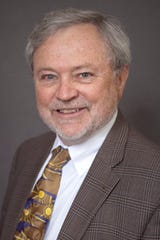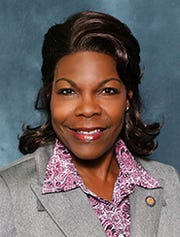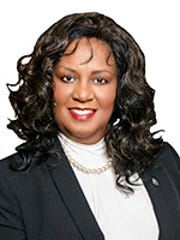Teams of professionals reviewing the
deaths of the elderly when abuse or neglect is suspected would help
protect Florida's seniors in nursing homes, advocates argue.
“I
think in every major urban area, it’s absolutely essential that they
have an elder death review team in place,” said Paul Greenwood, a former
prosecutor in San Diego who headed one of the nation’s largest elder
crimes units. He now educates police officers and prosecutors nationwide
on pursuing such cases.
Greenwood and others argue
such review teams would help reduce the practices identified by a USA
TODAY NETWORK - FLORIDA investigation into the state's nursing homes. In
54 deaths where neglect and mistreatment were identified by another
state agency from 2013 through 2017, Florida's Agency for Health Care
Administration rarely took action and in some cases didn't investigate
the deaths, the Network investigation found.
The
Network’s series on nursing homes also showed how AHCA rarely takes
serious actions against poor-performing nursing homes, and how it has
allowed dozens of nursing homes to limp along for years, providing
substandard care, and abusing, neglecting and even killing patients with
little consequence.
Greenwood reviewed several of the cases included in the Network’s investigation and said each would have benefited from a follow-up review. He called the 2017 death of York Spratling at Consulate Health Care of Jacksonville “the classic case that needs to be submitted to an elder death review team.”
Spratling, 84, died after surgery to remove dead tissue from his rotting
genitals, which became infected when he wasn’t regularly bathed at the
nursing home. The nursing home’s staff didn’t alert a doctor about the
wounds or severe infection for five days, a review by Florida's
Department of Children and Families found.
Spratling’s death was due to inadequate supervision and medical neglect, according to the review by DCF,which investigates elder abuse and neglect. However, AHCA took no action against the nursing home, and no criminal charges were filed in the death.
Full Article & Source:
Neglected: Could review teams prevent deaths of elderly patients by Florida nursing homes?
When a child dies in Florida and there’s even a hint
of possible abuse or neglect, a team of professionals tries to find out
if and how the death could have been prevented.
It’s
been that way for nearly 20 years, after the Florida Legislature
established the Child Abuse Death Review Committee in 1999, with the
goal of reducing child deaths in the state. Ten years later the state
established domestic violence death review teams in response to an
increase in domestic violence-related homicides in Florida.
 |
| Paul Greenwood (Photo: San Diego County District Attorney's Office) |
But there is no comparable review when an elderly or vulnerable adult dies in Florida, even under suspicious circumstances.
Proposed legislation to establish elder death review teams has failed to pass the Legislature the last two years.
Review
teams, Greenwood said, could help determine if nursing home patients’
deaths were preventable or if there are lessons to learn that could
prevent another patient’s death.
San Diego County
established a death review team more than 15 years ago. The team
included, among others, prosecutors, police, a medical examiner, health
care administrators and adult protective services investigators.
Lessons learned
Greenwood reviewed several of the cases included in the Network’s investigation and said each would have benefited from a follow-up review. He called the 2017 death of York Spratling at Consulate Health Care of Jacksonville “the classic case that needs to be submitted to an elder death review team.”
| York Spratling(Photo: Family photo) |
Spratling’s death was due to inadequate supervision and medical neglect, according to the review by DCF,which investigates elder abuse and neglect. However, AHCA took no action against the nursing home, and no criminal charges were filed in the death.
“This is where we would
say, 'No. 1, was this death preventable?' And I think the answer is,
'Yes,' ” Greenwood said. “ ‘No. 2, what lessons can we learn from it?’
And one of the lessons we can learn just from looking at this case is
the lack of exchange of information between relevant authorities.”
Death review teams improve investigations by bringing together people from a number of disciplines, said Teri Covington, director of the Washington, D.C.-based nonprofit Alliance for Strong Families and Communities.
State
Sen. Audrey Gibson, D-Jacksonville, has pushed legislation to
established elder death review teams in Florida’s 20 judicial circuits.
Her efforts have failed over the last two legislative sessions, but she
plans to file the proposal again.
“I
think there’s a lot of entrenched interests for whom it’s in their
interest that we don’t dig too deep,” Benson said. “And that’s what
elder death review teams do. They dig deep.”
Preventing death
The same
year Florida created its committee to review child deaths, the U.S.
Department of Justice recommended the development of death review teams
for the elderly. But unlike child death review teams, which are in every
state, only 13 states have established elder death review teams,
according to The National Center for Fatality Review and Prevention in
Washington, D.C.
Florida is not among them.
Bill
Benson, senior policy adviser at the National Adult Protective Services
Association in Washington, said one reason the nation hasn’t embraced
elder death review teams is because children’s deaths are typically
considered unusual. An elderly person's death, however, is usually not
considered peculiar.
“What’s unusual about that?”
Benson said. “And that becomes a way to cover up an awful lot of deaths
that probably shouldn’t have happened.”
 |
| Bill Benson, national policy adviser for the National Adult Protective Services Association. (Photo: Contributed) |
The
goal of a death review team is not to place blame or force
court action, although that can happen if it turns out the death was due
to neglect or abuse, Benson said.
The primary
reason for review teams is to learn from deaths and discern ways they
could have been prevented. That could lead to policy changes, new
regulations or updated procedures, Benson said.
“It’s a dual purpose, prevention and then correcting the behavior that took place,” he said.
The
Women's Center of Jacksonville is in the planning stages of an elder
fatality review team pilot project examining the closed criminal cases
involving elder abuse, neglect or exploitation.
The
goal would be to see if "a change in policy or procedures may be
needed," said Community Education Director Eleen Rodden. "To see if
there is something in the system that needs tweaking."
The
team would not look at a nursing home case, however, where there was no
criminal prosecution, even if there was a finding of neglect by
Florida's Department of Children and Families, Rodden said. And the
program is limited to Duval, Nassau and Baker counties. Rodden said she
knew of nothing similar in other counties in Florida.
Working together
Death review teams improve investigations by bringing together people from a number of disciplines, said Teri Covington, director of the Washington, D.C.-based nonprofit Alliance for Strong Families and Communities.
The
teams identify systems that are failing or can be improved, and they
can identify risk factors in unnatural deaths that can lead to
prevention efforts. It’s also possible a team could review a death and
discover a perpetrator who intentionally caused it, Covington said.
The
death review teams also provide data that can make the public aware of
the problem. Because elder deaths are rarely reviewed and often assumed
to be due to old age or a chronic condition, “you let people get away
with murder,” she said.
 |
| Sen. Audrey Gibson, D-Jacksonville (Photo: Carroll Gambrell) |
Gibson said her
goal for the statewide effort is to impact public policy, and to
determine if state resources exist to prevent unnecessary elder deaths.
“As
a policymaker, we’re not looking for fault,” Gibson said. “We’re
looking for improvement in the quality of life in an elder, period.
“If
something happened that negatively impacted the life of that elder, and
there are things policywise we can do to prevent that moving forward,
we have an obligation to do that.”
Rep. Barbara Watson, D-Miami Gardens, who has pushed
unsuccessfully a companion bill in the state House, said her interest in
the legislation stems from a personal experience.
Years
ago, a friend’s father suddenly began to deteriorate at a Florida
nursing home. He stopped eating and stopped speaking, and the nursing
staff didn’t really seem to notice, she said.
“It
wasn’t until his autopsy that they found that he had actually swallowed
his dentures,” Watson said. “Why did the nursing staff miss his
dentures? Why did they not even try to discover what was the issue?”
 |
| Rep. Barbara Watson, D-Miami Gardens (Photo: State of Florida) |
Under
Gibson’s proposal, the review team's records on cases would not be
public and would not be turned over for civil or criminal cases,
although those same documents could be available from other sources. And
although the team's work would be confidential and focused on
recommendations for policy changes, nothing would prevent state agencies
from acting on information gleaned from individual cases.
The cases must be closed either by the DCF or law enforcement before coming to the team for review, she said.
The
idea of death review teams at times is opposed because of concerns over
cost, even though most teams are volunteer efforts and require funding
only for organizational and administrative costs, Benson, the
Washington-based policy adviser,said.
Opposition
to death review teams also comes from health care providers, nursing
home owners, assisted living facilities and others in the health care
industry, he said.
Full Article & Source:
Neglected: Could review teams prevent deaths of elderly patients by Florida nursing homes?


1 comment:
Yes!
Post a Comment